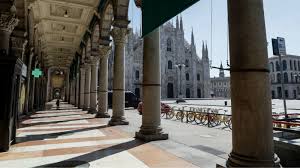Italy: A snapshot of solidarity and fortitude

Rome: Some say spring is the best time to visit Italy. In villages and towns across the nation, early evening sunshine streams down narrow streets as the church bells toll and city folk step out for their passegiatas.
This year, such picture postcard images of Europe’s favourite tourist destination have been replaced by ghoulish snapshots of coffin-laden army trucks on their way to out-of-town burial sites.
It is not just the hospitals. In some parts of Lombardy, even the crematoriums are full.
For many Italians one of the most unbearable aspects of all of this “pain without ceasing” is the experience of losing a loved one without the opportunity to be with them as the moment of death approaches.
The agony of death is a shared moment of intense bonding. Not being able to comfort a grandparent, a father, a mother, sister or brother, to caress their hand, in those last moments of life, is devastating.
Boccaccio, the great renaissance author, who wrote his masterpiece The Decameron at the time of the Black Death, said: “Human it is to feel compassion on the unhappy.” Italians, like the rest of us, are only human.
In Italy, where the extended family is the cornerstone of community and social cohesion, the emotional and psychological trauma of the Coronavirus outbreak has been extreme.
It is also true that the resilience shown by the Italian institutions, healthcare sector, public authorities and public at large has been extraordinary.
Paradoxically, the closely-knit pattern of life in Italy helps to explain both why mortality rates have been so high and why communities have been so resilient.
The structure of the Italian population is heavily skewed towards the elderly. Unlike in nations such as the UK for example, most elderly Italians still live at home, often with their younger relatives.
Italy was caught off guard as the first European state to be afflicted by the Coronavirus pandemic. Social distancing was a challenge because there are so many multi-occupancy homes, reflecting the traditional structure of Italian families. At the same time, those very close-knit communities have made the strategy of containing the virus very successful. The incidence of the virus is as skewed from a regional as it is from a demographic perspective.
A big part of the successful containment strategy has been the role of the local mayors. If Germany has a Chancellor, known affectionally as Mutti, who keeps her head in a crisis, Italy has its Mayors.
“The agony of death is a shared moment of intense bonding. Not being able to comfort a grandparent, a father, a mother, sister or brother, to caress their hand, in those last moments of life, is devastating”Where I am based in Italy, not far from Pisa, the local mayor gives a daily video conference on Facebook. It is a masterclass in how to reassure, inform and build consensus with the community.
At times it is also very funny. Yesterday, he reminded his constituents they should only shop once a week. “Don’t think you can pop out on the pretext of having forgotten your toothpaste – we know who you are!”
In most parts of Italy there is also a very active voluntary and charitable sector, though just as everywhere else in Europe this is being put under incredible stress as more is demanded but with less in the way of support.
After three weeks locked down at home, interrupted by only two visits to the local shops, (once to buy groceries, the other to buy toothpaste), I was amazed to hear a knock at my front door.
Outside stood two women from the local Misericordia. One might call them the “Sisters of Mercy.” They had uniforms, masks and clipboard. They gave me a mask and ticked me off their list.
Two weeks later there was another knock at the door. It was the same two women, bringing me, and every resident of my village, another mask, (a better one than before) and news that a third would be coming soon.
There is much that the rest of Europe, the rest of the world, can learn from Italians’ response to the Coronavirus and I don’t just mean the balcony singing which has had everything from the raucous to the sublime.
The word that has come to sum up the extraordinary mobilisation that has occurred in Italy since the first deaths were recorded is solidarity. Solidarity within communities, between generations and across regions.
The virus that broke out in Northern Italy spread quickly to the rest of Europe but the spirit of solidarity which erupted in Italy at the same time has been slower to take root, though there are signs it is doing so at last.
When the crisis began, the Italian President, Sergio Mattarella, wrote to EU Council President Charles Michel saying: “No country can do it alone in this crisis. We must help and support each other.”
It was nearly two months before other EU Member States sent masks and other protective equipment to Italy. More help is now on its way, including financial assistance, but the slow response will be remembered.
For many Italians the lack of solidarity shown by the EU took their breath away as much as the virus itself.
As former Italian Prime Minister, Enrico Letta (now based in Paris) has made very clear, Coronavirus affects all Member States of the EU equally, it is not “an Italian problem.” There must be a European response.
Meanwhile, in my small village, there is sadness in the eyes of the shopkeepers, and other local people who I meet (from a distance) on my weekly visit to the local supermarket.
As we wait our turn to go in, peering at each over the top of our masks, standing at the regulation two metres apart, one local resident breaks the silence: “The money is about to run out, what will we do then?”





